The Rabbit Read online
Page 2
Clacker put his folded jacket down on the platform’s edge, in the shade of a wheelbarrow, took a hammer that had been perched across the barrow’s handles, and got down into the adjacent wagon which was half full of stone. I watched him begin to sort through the stone, looking for flints.
“See what Clacker’s doing,” my father said. “If he sees any loose flints he chucks them out into the barrow. Into the barrow, mind. They play hell with the tires.”
As if to underline what my father had just said, Clacker positioned a big stone on top of the pile and raised his hammer and shattered the stone. Pieces flew against the wagon’s side with the force of bullets. Then Clacker bent down and picked out the flint and lobbed it into the barrow. My father said:
“With the big stones, doesn’t matter whether there’s flints in it or not. Crack it anyway. Big stones won’t go through steelworks’ crusher. Have you got the idea?”
“I think I just about grasp it.”
“Right. I’ll get you a hammer.” My father turned towards the kiln. “Frank!”
There was the clattering of studded boots on iron and Frank Peacock appeared at the top of the chute, arms stretched out wide, hands grasping the chute’s sides.
“Yes, Mr Graves?”
“Frank, see if you can find a spare hammer, will you? A fourteen-pounder.”
“Right.”
Frank slithered back out of sight. My father turned back to me.
“You may as well get in the wagon and start looking for loose flints.”
“Right.”
I got into the wagon. Clacker carried on working without taking any notice. I bent down and found a few flints and threw them into the barrow, then I looked for more flints but at first I couldn’t see any.
“Behind you,” said my father.
I looked round but I couldn’t see where he meant.
“There. In the corner.”
I saw the flint and scrambled into the corner and threw out the flint but I missed the barrow. My father bent down and picked up the flint and dropped it into the barrow.
“If you can’t get them in just stack them on the edge of the platform and put them in when you’ve done a wagon.”
Yes, all right, I thought. Why don’t you sod off and let me get on with it?
Frank arrived with the hammer.
“Here you are, young Victor,” he said. “See how you manage with this.”
Frank leant forward and handed me the hammer. Its unexpected weight caused me to stumble and slide down into the empty half of the wagon. I climbed back to the top of the heap, red-faced under the gaze of Frank and my father. I found a big stone and positioned it the way Clacker had done. Up to this point Clacker had carried on working, but now he stopped to watch.
I lifted the hammer and brought it down on the stone. The stone remained intact and the hammer glanced off the stone’s surface and swung between my legs, just missing my right shin, causing me to lurch forward.
“Careful,” said my father.
“That’s the fast way to getting a broken leg,” said Frank.
“Show him, Frank,” said my father.
Frank jumped down into the wagon and took the hammer from me. Clacker kept on watching.
“See,” said Frank. “Always grab it with one hand halfway up the handle and one hand just below the head so that you can slide the hand below the head down as the hammer falls. With your other hand in the middle then the hammer won’t go off in all directions. Let the hammer do the work. See, like this.”
Frank demonstrated the hammer technique without hitting the stone.
“That’s right, Victor,” said my father.
“And always tap with the seam of the stone, not against it,” said Frank. “See, look when I tap against it. Nowt. With...”
He tapped the stone again and it fell apart easily and unspectacularly.
“Got it?”
I nodded. Frank gave me the hammer and got out of the wagon. Clacker started working again. I looked round for another big stone.
“I’ll leave you to it then,” said my father.
“Right,” I said.
“Remember what I said.”
I frowned and concentrated on searching for a stone. I should have replied because he said:
“Take it easy. Don’t knock yourself out.”
Jesus, I thought, he had to say it. He knew I understood. And he must know how I’m feeling. But that’s him. He bloody knows how I’ll feel about something but he’ll go right ahead and do it in front of everybody.
He turned to Frank and took out his cigarettes.
“How are we doing for stone on the kiln, Frank?”
“We’ll need at least two extra today, boss.”
They began to walk away from the platform’s edge, towards the kilns.
There was a big stone just to the right of Clacker. I waded across the heap towards the stone but before I could reach it Clacker turned casually to his right and gave the stone a light, one-handed tap with his hammer. The stone fell apart like the one that Frank had cracked. I just stood there like a clown and watched. After he’d done it all I could do was to turn away and pretend to look for some more flints.
Clacker put down his hammer and straightened up and took a packet of Woodbines from his shirt pocket. He lit up and put the packet back and took off his shirt and stretched out and neatly draped it over one of the barrow’s handles. Then he dragged on his cigarette and looked reflectively in the direction of the kilns. My father and Frank were standing by the chute, talking. I looked at Clacker’s wide back. Pink wet patches glistened on his vest. Then Clacker turned to pick up his hammer and caught me looking at him. I looked up into the still sky.
“It’s going to be hot,” I said.
Clacker stayed poised, reaching out for the hammer. His eyes followed my gaze up into the sky, then back to me. After a while he said:
“Yeah, it does get hot, like. You know, in summer.”
He plucked the hammer off the stone and turned away. I laughed, more a snort down the nose, a sound meant to prove that I was a person who could not only take sarcasm but also appreciate the funny side of it.
“Yeah, it’s funny,” I said, taking his cue. “I’ve wondered about that. I’ve noticed how it seems to get hotter round this time of year.”
“You have, have you?” Clacker said, splitting a small stone, holding the hammer shaft just below the head. “That’s what they teach you in college nowadays, is it? Brainy stuff.” He bent down and threw the flint into the barrow, then straightened up. “No, I’ll tell you what it is: people usually do get a bit warm when they do some hard work for a change.”
Clacker slithered down into the empty half of the wagon and began to throw out some more flints. I was standing watching him when my father reappeared at the platform’s edge.
“What about that one there?” he said.
I looked around, then looked at my father.
“Which one?”
“That one there. Right next to you.”
I looked at the stone.
“What about it? There’s no flint in it.”
“I can see that. It’s too big for their crusher, though, isn’t it?”
“I don’t know. Is it?”
“Miles too bloody big.”
I didn’t believe him. He was just drawing attention to the fact that I’d been standing about when he’d come back.
I cracked the stone but it took me two swings.
“What about that one in the corner?”
I turned round again. There was a tiny flint right in the corner of the wagon where the sides came together. I picked it up and threw it out.
“You must have eyes like a hawk,” I said.
&nbs
p; “You don’t have to have eyes like a hawk to spot one as big as that.”
My father walked over to the car, got in and eased it away down the ramp.
“You’ll have to do better than that while your old man’s about,” said Clacker, not bothering to turn round as he spoke. “Still, it’s not as though you’re making a career of it, is it?”
I was about to answer when my father’s car reversed back up the ramp. The car stopped by the wagon. My father got out, not bothering to switch off the engine. He was holding my sketchbook in his hand.
“You forgot this. You might want to do something at breakfast.”
I reached up and took the sketchbook. I was embarrassed, even though Clacker still had his back to me. I put the sketchbook down on the platform’s edge, near the barrow, as quickly as possible, but my father said:
“You want to be careful, Clacker. He’ll be getting you to pose for him if you’re not careful.”
“I doubt if I’d stay still long enough for him to catch me.”
My father grinned at me. I glared back. Still grinning, he got back in the car and drove away down the ramp. Clacker put his hammer in the barrow and perched himself on the edge of the wagon and took out another cigarette and lit up. I concentrated on finding flints as a means of avoiding Clacker’s gaze. The platform was quiet now. On the kiln, the lift was still. The heat from the kiln’s top melted the sky. I couldn’t see any more flints so I said to Clacker:
“Is this one done, then?”
Clacker was staring at the road brightly bordering the wheatfield.
“’Appen,” he said.
I put down my hammer and heaved myself up the wagon’s side and sat on the edge opposite Clacker.
“Is there another lorry load for this wagon?” I said.
Clacker nodded.
“In a minute or two,” he said. The way he answered made my question sound as though it had been framed by a half¬wit. He still stared at the road, waiting for the lorry to materialize, as if its materialization would prove a wry point to support Clacker’s view of the way the world was ordered.
I leant forward and picked a small stone off the top of the heap and jiggled it around in my hand.
Clacker shifted his position and turned his attention to my sketchbook.
“Off to do some drawing then, are you?” He pronounced drawing as if it had an extra “r” in it between the “w” and the “i.”
I looked at my sketchbook as if I’d forgotten it was there.
“Oh, yeah,” I said. “Might do some. At dinner-time, like.”
Clacker didn’t say anything. By way of explanation I said:
“They give you a lot of work to do during your holidays.”
I deliberately didn’t mention the word college.
“Oh, aye,” said Clacker, grinning to himself.
“Yes,” I said. “Holiday work. You know.”
Clacker nodded at the pile of stone.
“This isn’t holiday work, then?”
“’Course it bloody is.”
The word “bloody” came out all wrong. It should have just rolled off the tongue unnoticed, its delivery proving me to be one of the boys, but instead it seemed to gurgle up in my throat like the cough on a first cigarette.
“It bloody is, is it?” Clacker said, emphasising the “bloody.”
I balanced the stone on the wagon’s edge.
“Yes. It’ll make a change.”
Clacker didn’t say anything. He just continued grinning at me in his insolent thoughtful way.
“A change does you good. You can get fed up with too much... too much drawing and that.”
“Oh aye?”
“And still having to do it during your holidays. As well as having to earn some cash.”
There was the sound of a lorry on the road. Clacker dotted his cigarette on the wagon’s edge and looked towards the road.
“Aye, life’s hard for some,” he said, unfolding his shirt and dropping the cigarette in the top pocket.
The lorry turned in off the road and ground its way up the ramp. When it was opposite the wagon Clacker and I were in, the lorry swung away from the platform’s edge, towards the flint tip, then backed up until the back wheels were resting against the platform’s raised lip. The engine cut out and there was a few seconds clear silence. Then the whirring of the lorry’s automatic tipping mechanism began. The driver’s door opened and Arthur Akester jumped down and walked to the back of the lorry and unbolted one side of the tailboard. Clacker got up off the wagon’s edge and unbolted the other side. I picked up my hammer and climbed out of the wagon and watched. The rear of the lorry rose up into the air. The tailboard flapped outwards and hung at ninety degrees but the load of limestone remained inert, even though the tipper continued to rise higher and higher. A few small stones rolled off the top and clanged down into the empty wagon. Then the whole load bulged out under the tailboard and shattered down into the wagon, filling the empty half up to the wagon’s brim.
Clacker walked round the front of the lorry and stood beside Arthur, who had started rolling a cigarette. When the cigarette was lit, Arthur took a pencil and a log book from the top pocket of his overalls. He licked the pencil lead and entered the load in his book, put the book away and took a folded racing paper from his back pocket. He made a few marks on the paper. Clacker leant against the side of the lorry, slightly behind Arthur, and studied him in his private way. Still looking at the paper, Arthur said:
“What are you on today, then, Clacker?”
“Why, are you stuck then?”
I got down into the wagon and began looking for flints.
“Oh, I’ve a few feelings,” said Arthur.
“Feelings aren’t enough, though, are they?”
“I don’t know so much. They were yesterday. In the fourth at Lincoln.”
Clacker walked over to Arthur and looked over Arthur’s shoulder at the paper.
“Got any feelings about Lugarno, then, Arthur?”
“Not many.”
“That’s what I’m on today.”
“What else?”
“Nowt.”
Arthur shook his head and smiled.
“It’s a funny field all round today,” Clacker said. “Lugarno’s only one with sense to its record. I reckon it’s about ready.”
“Daft talk,” said Arthur. “There’s three odds-on certs all the way today.”
“Odds-on, yeah, but they won’t win. Lugarno, Arthur. I’m on Lugarno.”
Arthur put his paper away and re-lit his roll-up. Clacker picked up his hammer and got back into the wagon.
“Come on then, Arthur,” he said. “Back int’ cab. No de¬bating today. It’s work to rule for a bit.”
I looked up. Clacker wasn’t looking at me. He was smiling that interior smile of his. Arthur was smiling too, directly at me.
“Why, are you worried, then, Clacker? I shouldn’t bother,” he said.
He winked at me and then he walked to the cab and got in. He started the engine and stuck his head out of the window and shouted to us.
“I’ll bring another load and then I’ll take you up to break¬fast.”
The lorry moved off. I threw a flint into the barrow. Silence hung like dust on the platform. I looked at Clacker ferreting about in the stone.
“Shall I empty the barrow?” I said.
Clacker looked at the barrow and nodded. I got out of the wagon. I stood by the barrow and said:
“You don’t have to worry about me, you know. I mean, because he’s my father. It doesn’t matter to me what any¬body does. It’s up to him to run the business.”
“That’s right,” Clacker said.
He threw another flint into the barrow. I waite
d for a minute but he didn’t say anything else so I got out of the wagon and took hold of the handles of the barrow. Then I noticed my sketchbook still on the lip of the platform. I picked it up and put it on top of the barrow and wheeled the barrow over to the other side of the platform, where the flint tip began. I took the sketchbook off the barrow and put it in the shade of the tarpaulin lean-to. Then I tipped up the barrow. The flints raced down the tip, some of them bouncing into the wheatfield at the bottom.
Breakfast.
The lorry stopped outside the office. The two other lorries were already there. Men were walking up the slope from the quarry.
The office was a single-storey breeze block building with a flat roof and two rooms and a toilet. The toilet was between the two rooms, one being my father’s office, the other the men’s canteen.
Clacker and Arthur and I got down from the cab and began to walk over to the office. My father appeared at the doorway. He nodded to me.
“All right?” he said.
I nodded back.
“Where are you having breakfast? In here or with the men?” he said.
“With the men,” I said.
My father handed me my satchel.
“You left this in the car.”
“Thanks.”
My father went into the office. One of the men walking up from the quarry called to Clacker:
“I see you’ve drawn easy straws this week, then, Clacker.”
Clacker’s expression was bitter as he called back:
“Oh, aye. Bloody easier than sitting in Safety hut smoking myself to death, is it?”
There was laughter from the man who’d called out. I followed Clacker and Arthur into the canteen. There was a coke stove in the middle of the floor and on the stove were two large billy cans full of tea. This stove and the stove in my father’s office and all the tea-making were attended to by Fred Cook, an old man who’d worked in the quarry in his younger days. I’d often seen him when I used to visit the quarry as a small boy. Round the walls of the canteen there were rough benches and on the walls themselves were pin-ups and comic postcards. Under the benches, at one particular spot, there were stacks of old racing papers. In one corner of the room was a pile of old lorry tires.

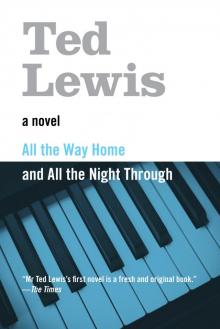 All the Way Home and All the Night Through
All the Way Home and All the Night Through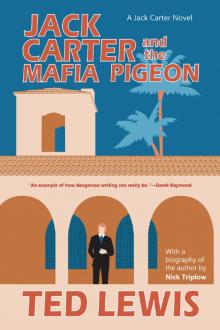 Jack Carter and the Mafia Pigeon
Jack Carter and the Mafia Pigeon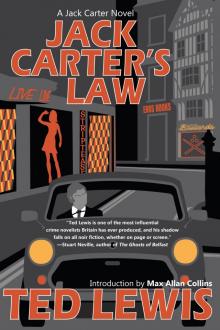 Jack Carter's Law
Jack Carter's Law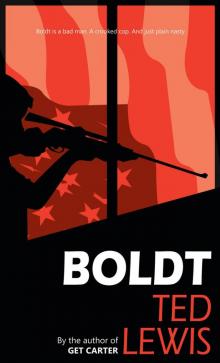 Boldt
Boldt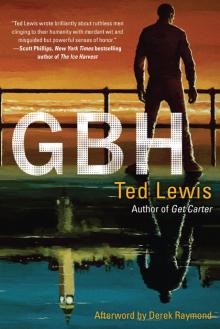 GBH
GBH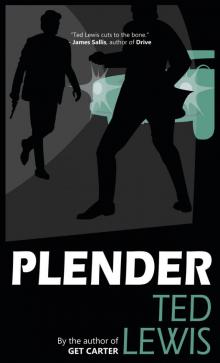 Plender
Plender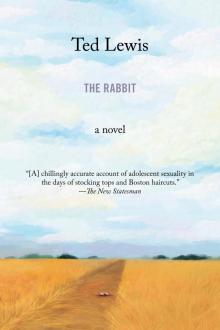 The Rabbit
The Rabbit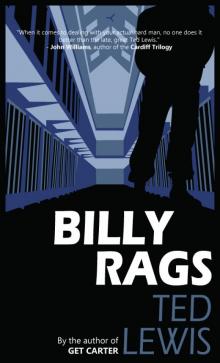 Billy Rags
Billy Rags